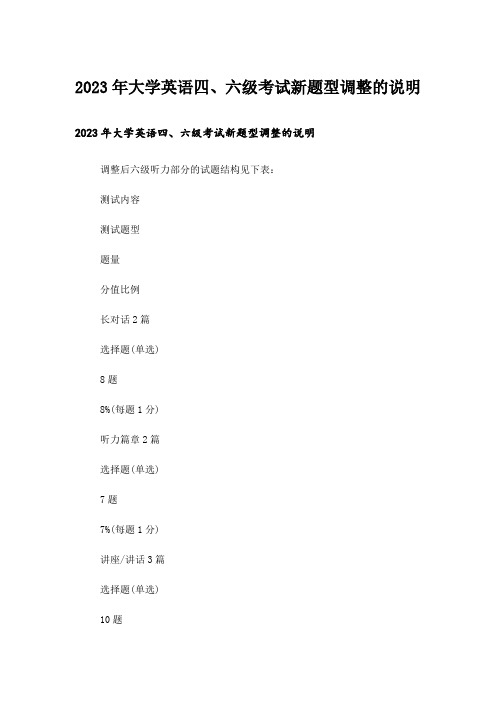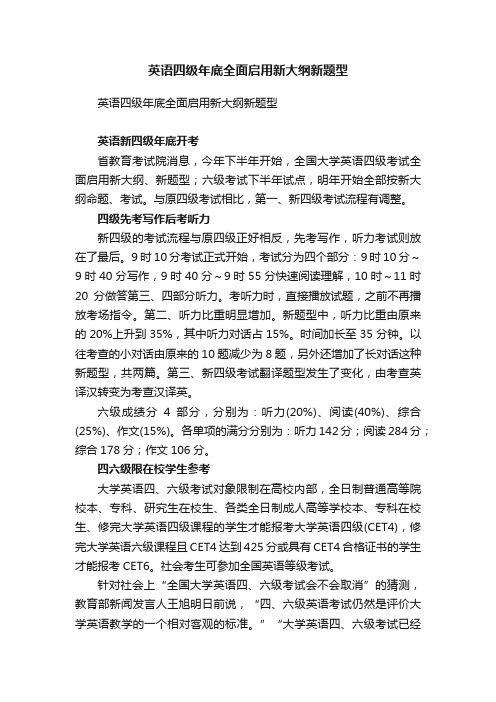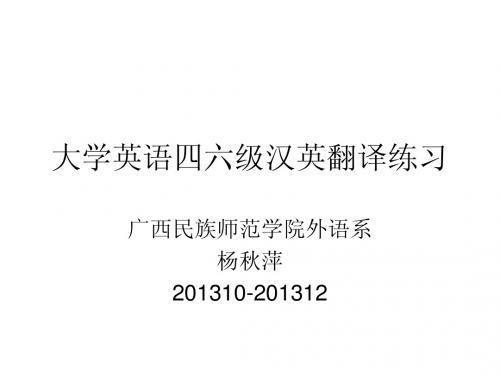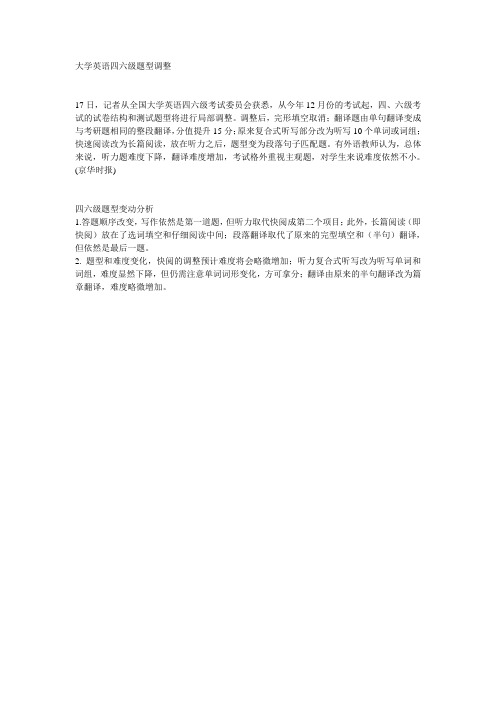大学英语四六级新题型
2023年大学_大学英语四、六级考试新题型调整的说明

2023年大学英语四、六级考试新题型调整的说明2023年大学英语四、六级考试新题型调整的说明调整后六级听力部分的试题结构见下表:测试内容测试题型题量分值比例长对话2篇选择题(单选)8题8%(每题1分)听力篇章2篇选择题(单选)7题7%(每题1分)讲座/讲话3篇选择题(单选)10题20%(每题2分)1、六级听力之不变原来的长对话题型不变,依然是2篇。
但题目数量由7道题增至8题,依然每题1分;篇章听力题型不变,但题目数量由原来的3篇共10道题减少至2篇共7题,每题1分。
题型及难度没有变化,考生可参考旧题。
2、六级听力之变化短对话取消,听写取消。
增加讲座/讲话题型3篇共10道题,每题2分,是六级听力考试乃至全卷的关键。
下面我们就来详细解析一下新题型:Now listen to the following recording and answer questions 16 to 19.16. A) They investigate the retirement homes in America.B) They are on issues facing senior citizens in America.C) They describe the great pleasures of the golden years.D) They are filled with fond memories of his grandparents.17. A) The loss of the ability to take care of himself.B) The feeling of not being important any more.C) Being unable to find a good retirement home.D) Leaving the home he had lived in for 60 years.18. A) The loss of identity and self-worth.B) Fear of being replaced or discarded.C) Freedom from pressure and worldly cares.D) The possession of wealth and high respect.19. A) The urgency of pension reform.B) Medical care for senior citizens.C) Finding meaningful roles for the elderly in society.D) The development of public facilities for senior citizens.原文:Moderator:Hello Ladies and Gentleman, it gives me great pleasure to introduce our keynote speaker for todays session, Dr. Howard Miller. Dr. Miller, Professor of Sociology at Washington University, has written numerous articles and books on the issues facing older Americans in our graying society for the past 15 years. Dr. Miller:Dr. Miller: Thank you for that introduction. Today, Id like to preface my remarks with a story from my own life which I feel highlights the common concerns that bring us here together. Several years ago when my grandparents were well into their eighties, they were faced with the reality of no longer being able to adequately care for themselves. My grandfather spoke of his greatest fear, that of leaving the only home they had known for the past 60 years. Fighting back the tears, he spoke proudly of the fact that he had built their home from the ground up, and that he had pounded every nail and laid every brick in the process. The prospect of having to sell their home and give up their independence, and move into a retirement home was an extremely painful experience for them. It was,in my grandfathers own words, like having a limb cut off. He exclaimed in a forceful manner that he felt he wasnt important anymore.For them and some older Americans, their so-called “golden years”are at times not so pleasant, for this period can mean the decline of not only ones health but the loss of identity and self-worth. In many societies, this self-identity is closely related with our social status, occupation, material possessions, or independence. Furthermore, we often live in societies that value what is “new” or in fashion, and our own usage of words in the English language is often a sign of bad news for older Americans. I mean how would your family react if you came home tonight exclaiming, “Hey, come to the living room and see the OLD black and white TV I brought!” Unfortunately, the word “old” calls to mind images of the need to replace or discard.Now, many of the lectures given at this conference have focused on the issues of pension reform, medical care, and the development of public facilities for senior citizens. And while these are vital issues that must be addressed, Id like to focus my comments on an important issue that will affect the overall success of the other programs mentioned. This has to do with changing our perspectives on what it means to be a part of this group, and finding meaningful roles the elderly can play and should play in our societies.First of all, Id like to talk about . . .16. What does the introduction say about Dr. Howard Millers articles and books?17. What is the greatest fear of Dr. Millers grandfather?18. What does Dr. Miller say the “golden years” can often mean?19. What is the focus of Dr. Millers speech?解:这是一篇关于老龄化社会,老年人的晚年生活等问题的演讲。
英语四级年底全面启用新大纲新题型

英语四级年底全面启用新大纲新题型英语四级年底全面启用新大纲新题型英语新四级年底开考省教育考试院消息,今年下半年开始,全国大学英语四级考试全面启用新大纲、新题型;六级考试下半年试点,明年开始全部按新大纲命题、考试。
与原四级考试相比,第一、新四级考试流程有调整。
四级先考写作后考听力新四级的考试流程与原四级正好相反,先考写作,听力考试则放在了最后。
9时10分考试正式开始,考试分为四个部分:9时10分~9时40分写作,9时40分~9时55分快速阅读理解,10时~11时20分做答第三、四部分听力。
考听力时,直接播放试题,之前不再播放考场指令。
第二、听力比重明显增加。
新题型中,听力比重由原来的20%上升到35%,其中听力对话占15%。
时间加长至35分钟。
以往考查的小对话由原来的10题减少为8题,另外还增加了长对话这种新题型,共两篇。
第三、新四级考试翻译题型发生了变化,由考查英译汉转变为考查汉译英。
六级成绩分4部分,分别为:听力(20%)、阅读(40%)、综合(25%)、作文(15%)。
各单项的满分分别为:听力142分;阅读284分;综合178分;作文106分。
四六级限在校学生参考大学英语四、六级考试对象限制在高校内部,全日制普通高等院校本、专科、研究生在校生、各类全日制成人高等学校本、专科在校生、修完大学英语四级课程的学生才能报考大学英语四级(CET4),修完大学英语六级课程且CET4达到425分或具有CET4合格证书的学生才能报考CET6。
社会考生可参加全国英语等级考试。
针对社会上“全国大学英语四、六级考试会不会取消”的猜测,教育部新闻发言人王旭明日前说,“四、六级英语考试仍然是评价大学英语教学的一个相对客观的标准。
”“大学英语四、六级考试已经走过20年,考生规模已经达到1000多万人。
四、六级英语考试对我国高等教育英语教学质量的提高发挥了重要作用,不会被取消。
”。
大学英语四六级新题型-翻译部分练习

译文
Paper cutting is one of China’s most popular traditional folk arts. Chinese pape cutting has a history of more than 1,500 years. It was widespread particularly during the Ming and Qing Dynasties. People often beautify their homes with paper cuttings.
Where are they?
我国九大名关
山海关:在河北省秦皇岛市,是万里长城的起点,形势险要,自 古为交通要冲,有天下第一关之称。 居庸关:旧称军都关、蓟门关,在北京市昌平县西北部,长城要 口之一。控军都山隘道中枢,形势险要。 紫荆关:在河北省易县紫荆岭上,为河北平原进入太行山的要口 之一。 娘子关:在山西省平定县中部,建于初唐,因为平阳公主曾率娘 子军驻此,故名。当山西、河北两省要冲,形势险要。 平型关:在山西省繁峙县东北边境,邻接灵丘县,是长城要口之 一。向为晋北交通要冲。 雁门关:在山西省代县北部,是长城要口之一。 嘉峪关:在甘肃省嘉峪关市西,嘉峪山东南麓,长城终点,依山 筑关,居高凭险,自古为东西交通要冲。 武胜关:河南省信阳南部,为大别山隘口之一。 友谊关:一称大南关、界首关,在广西壮族自治区凭祥市西南。 明初置鸡陵关;清初改称南关;一九五三年改名睦南关;一九六 五年改友谊关。为中国通往越南的交通要口之一。
译文
• The Great Wall is one of the greatest wonders of the world created by human beings. If you come to China without climbing the Great Wall, it’s just like going to Paris without visiting the Eiffel Tower, or going to Egypt without visiting the Pyramids. Men often say, “ He who does not reach the Great Wall is not a true man.”
大学英语四六级新题型简介

Success depends on many factors, both physical and spiritual. However,mental factors like a strong will are far more decisive in enabling us to achieve success. For example, despite our repeated efforts to quit smoking, our lack of a strong discipline would still cause us to end up in failure。(论点)
Although it is commonly agreed that …, it is unlikely to be true that ….
There is an element of truth in this statement, but it ignores a deeper and more basic fact that ….
1
2
说明文则要求层次清晰,语言练达。
审查作文的题材和体裁:议论文,说明文和应用文
议论文要求逻辑严密,表达准确。
应用文还要看语域(主要指语言使用是否符合场合)和格式。
审题
如何谋篇
如何谋篇
善于借助已给提纲 六级作文往往给出提纲,这大大节省了考生的构思时间。所以考生要借助提纲理解出题者的真正意图,然后无额定提纲中的关键词及个要点间的逻辑,整理自己的思路,对自己所想到的内容进行组织和安排。
应试作文的评分标准尽管描述语言不同,但都可以分为内容、组织和语言三个方面,如果是应用文,还要看语域(主要指语言使用是否符合场合)和格式。
改革后的四六级试题结构及新题型说明

改革后的四六级试题结构及新题型说明一、试卷描述四级和六级的试卷结构、测试内容、测试题型、分值比例和考试时间如下表所示:一、写作15%二、听力35%1、短对话单选8分2、长对话单选7分3、短文独白10分4、复合式短文词组及单词听写10分三、阅读理解35%选词填空(16选10)5分匹配题10分仔细阅读20分段落汉译英15分完形填空取消考试时间调整为130分钟二、新题型说明1. 写作要求不变,增加通知的写作方法。
本题改革前难度系数0.82,改革后难度系数0.83.2、听力单选题听力单选题难度下降,去掉推断题,加入细节分析题考察,淡化经济学,强化文化领域,四级语速不变,六级听力语速下降为原来的90%。
本题改革前难度系数0.85,改革后难度系数0.783、复合式听写原复合式听写调整为单词及词组听写,短文长度及难度不变。
要求考生在听懂短文的基础上,用所听到的原文填写空缺的单词或词组,共10题。
短文播放三遍。
本题改革前难度系数0.97,改革后难度系数下降为0.72.4、长篇阅读原快速阅读理解调整为长篇阅读理解,篇章长度和难度不变。
篇章后附有10个句子,每句一题。
每句所含的信息出自篇章的某一段落,要求考生找出与每句所含信息相匹配的段落。
有的段落可能对应两题,有的段落可能不对应任何一题。
改革前快速阅读题目难度系数0.75,改革后本题难度系数0.90.5、翻译原单句汉译英调整为段落汉译英。
翻译内容由校园、经济、艺术学改为校园、金融、儒学、政治经济学、中国近代历史、世界遗产、西方文化、经济学原理、社会发展学、遗传学、进化论。
四级长度为140-160个汉字;六级长度为180-200个汉字。
要求考上把整篇英语文章全部翻译为汉语,意思正确得半分,语法正确得1分,单词翻译错误名次三处扣1分,形容词1处扣1分,其余2处扣1分,逻辑错误不影响其他句子含义的本句扣半分,影响其他句子含义的扣1分到1分半,翻译内容包含文章无关意思的每处扣3分。
英语四级听力新题型解析及答题技巧精选全文

可编辑修改精选全文完整版英语四级听力新题型解析及答题技巧英语四级听力新题型解析及答题技巧从2016年开始,英语四级听力部分题型有了一些改变,针对这种改变我们应该如何有针对性的进行备考,今天我们来讲一讲关于听力部分题型改变之新增题型——短篇新闻类答题技巧。
一、四级听力题型变化自2016年6月考试起,全国大学英语四、六级考试委员会将对四级考试的听力试题作局部调整。
调整的相关内容说明如下:1.取消短对话。
2.取消短文听写。
3.新增短篇新闻(3段),每段设置2—3个小题,共7题,每小题1分,新闻长度130—190词。
4.长对话(2段)由原来的共7题调整为共8题,每小题1分,对话长度不变。
5.短文理解(3段)题型不变,分值由原来的'每小题1分调整为每小题2分。
6.考试时间由原来的35分钟减为25分钟。
二、新闻英语文体特点(一) 新闻报道“六大要素”新闻报道里的“六大要素”即常说的“人物(who)、时间(when)、地点(where)、事件(what)、原因(why)和方式(how)”。
在英语短新闻或内容提要中至少包括其中三个要素:who,what和when,这些是新闻报道中最具价值的三要素。
(二) 倒金字塔结构所谓倒金字塔结构,也称为倒叙法,即按新闻事实重要程度由要点到细节逐步扩展,安排全文。
倒金字塔结构把最重要的事实置于全文的第一句中,即新闻导语(the news lead)。
导语告知听众最新鲜、最关心、最重要的事实,如事件(what)、时间(when)、地点(where)、人物(who)以及原因(why)和方式(how)。
新闻导语是对整条新闻内容的高度概括,听懂了导语,也就听懂了新闻的主要内容。
当然,由于新闻报道的侧重点不同,有时新闻导语可能只包含其中的几个要素。
(三) 新闻英语词汇特点1.常用词汇表示特殊含义新闻报道常使用某些常见词汇来表达事实和事件,这些词汇经过长期使用逐渐取得与新闻报道相联系的特殊意义,成为新闻体词语(journalistic words)。
大学英语四六级考试改革后新题型模拟样题附答案和详细解析

大学英语四六级考试改革后新题型模拟样题附答案和详细解析大学英语四六级考试改革后新题型模拟样题测试时间:130分钟含涂卡考生号; 姓名:本试卷四六级通用试卷难度系数为基础六级难度但历年四级有时候题出难了的时候和这个难度基本上是一样的,不要看到六级难度的卷纸就放弃不练,新四六级考纲中关于四级和六级除了单词量要求不同外是没有任何区别的,然而近年来四级和六级的单词量界限已经越来越模糊,没有人能做到根据一堆四级单词立即写出一篇阅读来,真正的四级考试都是选自《经济学人》的纯英文读物,根本无法保证里面只有四级词汇,所以希望大家不要把四六级弄的界限那么轻,四六级四六级,从来不分家,四级题出难了就是六级题,六级题出简单了也可以当做四级题。
——新东方赵丽Part I Writing (30 minutes) 15分Directions: For this part, you are allowed 30 minutes to write an essay. Y ou shouldstart your essay witha brief descriptionof the picture and then expressyour views on the importance of learning basic skills. Y ou should write atleast 120words but no more than 180words. Write your essay onAnswer Sheet 1.注意:此部分试题请在答题卡1上作答。
听力听力音频(鼠标轻放此处按住ctrl并点击鼠标下载)Listening Comprehension (35 minutes)每题1分共计35分Section ADirections: In this section, you will hear 8 short conversationsand 2 long conversations. At the end of each conversation, one or more questions will be asked about what said. Both the conversation and the questions will be spoken only once. After each question there will be a pause. During the pause, you must read the four choices marked A) B) C) and D), and decide which is the best answer. Then mark the corresponding letter on Answer Sheet 2 with a single line through the centre.11 。
大学英语四六级题型调整

大学英语四六级题型调整
17日,记者从全国大学英语四六级考试委员会获悉,从今年12月份的考试起,四、六级考试的试卷结构和测试题型将进行局部调整。
调整后,完形填空取消;翻译题由单句翻译变成与考研题相同的整段翻译,分值提升15分;原来复合式听写部分改为听写10个单词或词组;快速阅读改为长篇阅读,放在听力之后,题型变为段落句子匹配题。
有外语教师认为,总体来说,听力题难度下降,翻译难度增加,考试格外重视主观题,对学生来说难度依然不小。
(京华时报)
四六级题型变动分析
1.答题顺序改变,写作依然是第一道题,但听力取代快阅成第二个项目;此外,长篇阅读(即快阅)放在了选词填空和仔细阅读中间;段落翻译取代了原来的完型填空和(半句)翻译,但依然是最后一题。
2. 题型和难度变化,快阅的调整预计难度将会略微增加;听力复合式听写改为听写单词和词组,难度显然下降,但仍需注意单词词形变化,方可拿分;翻译由原来的半句翻译改为篇章翻译,难度略微增加。
